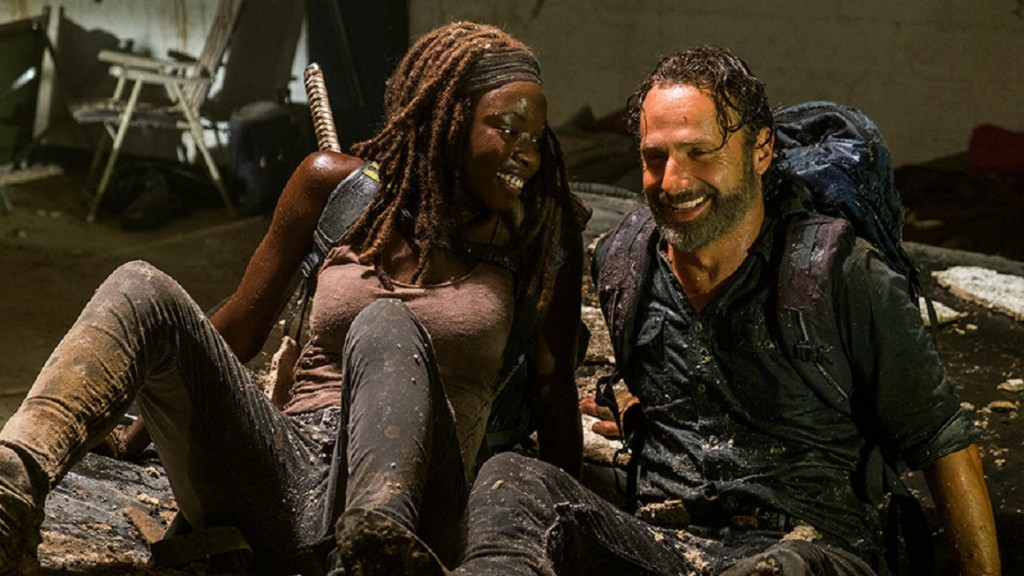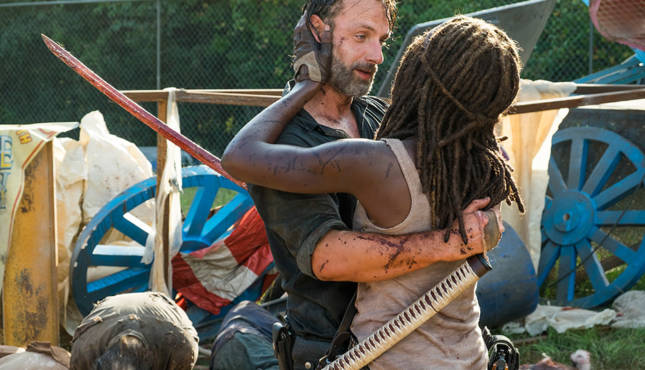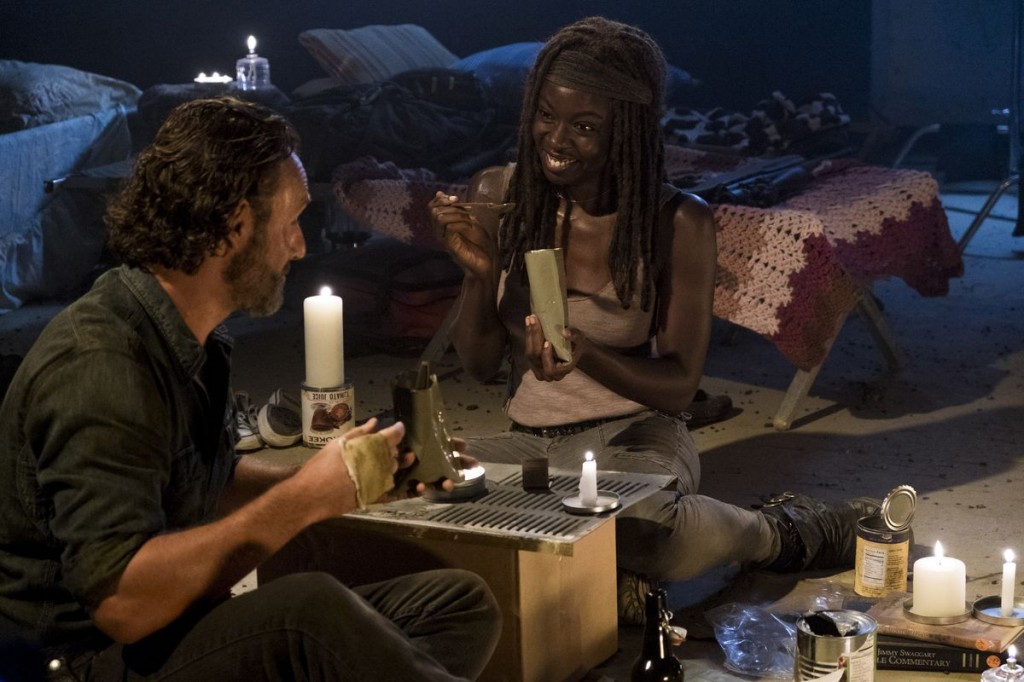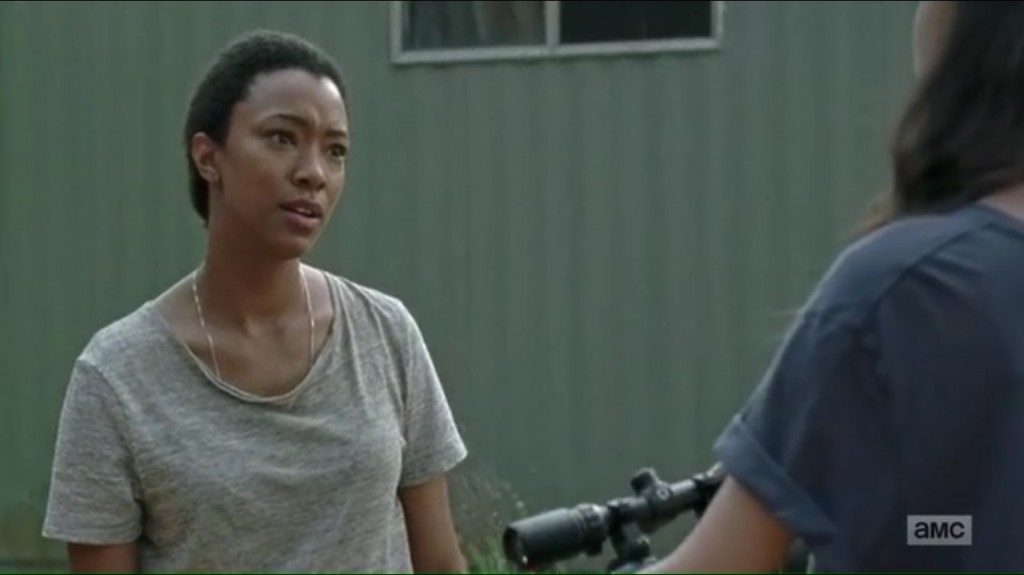
For a while now, the running line on The Walking Dead has been that the show is too bleak and too steeped in misery. The open-ended nature of the series, and thus the requirement for ever more adventures, means our heroes can never truly win. The abject state of the world has to continue. So for the plot to have any bite, people we care about have to keep dying; equilibrium can’t ever be established, and more problems and obstacles and losses have to pile up.
It’s understandable how the prospect of that continuing struggle wears on critics and viewers alike. Maybe I’m just jaded from years of post-apocalyptic fiction and other gritty works that allow me to take this sort of thing in stride. But I get it; the notion that this is simply the unending march of The Walking Dead, never to cease, with characters we like continually being picked off, could easily be too much for people.
But what I like about the show, what keeps me coming back (and, incidentally, what’s always underemphasized when this debate picks up again and again) is that The Walking Dead is also a show about what motivates people to go on in these circumstances. It’s about the emotions and connections that give the survivors something to fight for when there’s no institutions or societal expectations to force them to do it. It presents a world of outrageous freedom, one where people still choose to sacrifice and to love, where there is still joy and comfort regardless of whether the environment is hospitable to it.
What elevates “Say Yes” is how Rick and Michonne acknowledge that struggle, how they recognize what the current state of the world means for them, and how they find the happiness in it anyway. There is a strength that comes from a bond with someone else, a buoying connection to another person that can emerge even in the harshest of circumstances. It’s laced with the sad reality that such things, like all things, are only temporary, but it’s there and meaningful.
So when Rick and Michonne go out searching for guns to placate the Junkyardigans, and stumble across an unexpected supply at a walker-filled carnival campground, we see the two of them enjoying the closest thing to a honeymoon the world of The Walking Dead has to offer.
And it’s fun! Rick and Michonne are playful with one another. They are loving in their interactions. They embark on this quest, nominally a functional one to give them fodder to put up a fight against The Saviors, but they also use it as an escape, a chance to be together, just the two of them. There is banter, honest to god banter, and it is unexpectedly adorable.
To be frank, it’s the most I’ve cared about Rick in years. While Michonne has been one TWD’s most compelling figures for a while now, Rick has just sort of taken up space in recent seasons, doing much of the same “heavy is the head that wears the crown” material we’ve seen from him for a while. There’s a bit of that here too, but pairing him up with Michonne, having them fight together, laugh together, enjoy a little peace together, humanizes him. It turns him from the ever-conflicted leader of men into just another survivor enjoying time with someone he loves.
Of course, this being a show set in the zombie apocalypse, the way they spend that time is a little unorthodox. The carnival is a great setting, because it leads to all sorts of ways for Rick and Michonne to do perform their necessary task while adding a little whimsy to the proceedings. Small touches like Michonne winning a midway game using a real sniper rifle, or the pair falling through the roof and chuckling about it, or tucking into some ready-to-eat rations livens the atmosphere in a way that belies the show’s bleak reputation.
It also makes for some entertaining zombie set pieces. There’s a cockiness to Rick and Michonne when they gear up for the big zombie fight within the carnival itself. The pair has done this sort of thing for a while now. They’re confident in their strategy and abilities. That gives their campaign, even when it goes awry, plenty of room for fun. You can’t approach the walkers with this sort of jovial spirit every week, because it would take away the scariness of the show’s most persistent villains. Still, in “Say Yes” it makes the walker attack less about whether our heroes will survive, and more about the great dynamic between the two of them in the midst of the fight.
“Say Yes” does have one good scare. Perhaps it was naïve to think, even for a half-second, that The Walking Dead would kill off Rick in an unheralded mid-season episode. But when Michonne witnessed a crowd of walkers chowing down in the spot where Rick used to be, I at least wondered for a brief moment if the series would have the stones to go through with it. I attribute much of that to Danai Gurira’s superior acting skills, to where she can convey Michonne’s shock and distress at this seeming death, and her relief and gratitude when Rick (of course) emerges unscathed from some implausible, safe hiding spot. And the clever call back to the deer does a nice job at papering over some of the cheesiness of the fake out.
But that tense moment also serves to puncture that rarified air that Michonne and Rick were enjoying. It’s a reminder that no matter how on top of things they feel, this is a world of threats and that your happiness can be shattered in an instant. That sense of fun starts to dissipate. The excitement over the newly discovered mother lode is dampened. The playful back and forth gives way to ruminations on death and sacrifice. A thousand weary critics groan.
It’s not just Rick and Michonne, however, who ruminate on such things, to the episode’s detriment. In a clunkily-written scene, Tara talks to Judith (though mostly to herself, obviously) about whether to tell Rick and the gang about Oceanside, worrying about the lives that hang in the balance if she gets the Oceansiders mixed up in this. By the same token, Rosita grouses at Father Gabriel, goes on her own gun-hunt, and eventually meets up with Sasha. The two frenemies agree on a suicide mission to take out Negan, each feeling bereft of reasons to hang on and committed to avenging their lost loved ones even at the expense of their own lives.
“Say Yes” contrasts them with Rick, who accepts the same outlook but on different terms. He keeps trying to push off his and Michonne’s return, trying to extend this little vacation, just a couple of days more, because he knows the choices they’re coming back to. On the one hand, going back to Alexandria simply means returning to responsibility, to potentially having to be the person in charge of everything once Negan is toppled. Rick demurs on this point, saying that he wants to do whatever there is to do in tandem with Michonne, but there’s a definite sense that he’s enjoying the freedom from having to be the guy, from having to be the one who makes all these big decisions and tries to hold it all together.
But on the other, he also shows signs that he’s internalized Aaron’s lesson from “Hearts Still Beating.” Rick seems to have made some peace with the fact that there’s a good chance he or Michonne don’t make it out of this, that the upcoming war will lead to casualties of people they care about, because that’s what always seems to happen.
And yet, he also realizes that they have something to live for and something to die for, and that that’s a blessing in and of itself. They are fighting for the future, for the possibilities of the world to come. Rick wants to cherish the time he and Michonne get to share together, because he realizes it might be slipping away. Soon, he might not be around to experience that sort of joy. That is admittedly bleak, the sort of rough reality that puts off a number of viewers and reviewers.
But it’s also hopeful, and perhaps even joyful, in a different way. It’s a philosophy that acknowledges that even in the harshest of places, there is something to fight for, something worth putting your life on the line for, and something to be happy about. Rick and Michonne may be enjoying their last meal, so to speak, but it’s only because there are people they care about worth saving, and in their love, they still have bliss in the moment, however fleeting such moments may be.



